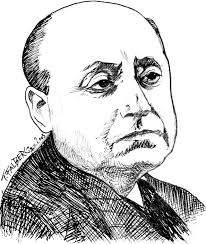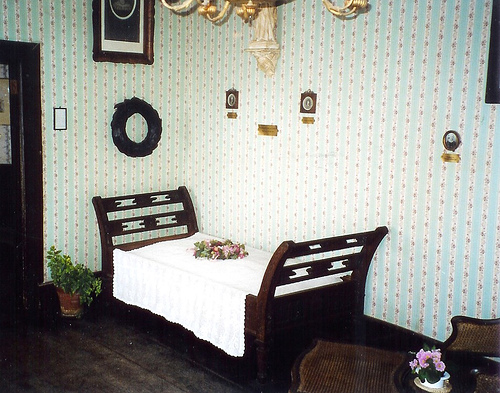It is gratifying to see a renewed interest in Gottfried Benn since the publication of new Benn translations by our most gifted translator of German fiction and poetry – Michael Hofmann (Impromptus: Selected Poems and Some Prose). Gottfried Benn ranks eighth among the Top Ten German Poets. But "revival" is probably not the right word. The truth is that Benn was never that popular, for he is a difficult poet. His most accessible poems date from his early "expressionist" phase (Morgue, 1912 and Fleisch 1917). These poems are shocking to read even today because of their clinical description of death and decaying flesh. But beginning with Statische Gedichte (1948) Benn's poetry becomes more difficult, admired from afar much like the poetry of Wallace Stevens
Much like Stevens (Notes Towards a Supreme Fiction – 1942) Benn was striving for the absolute poem – somthing he outlined the Probleme der Lyrik (1951) – the most influential postwar poetics. The task of the modern poet, Benn wrote, is to create "the poem without faith, the poem without hope, the poem addressed to no one, the poem of verbal skill whose goal is to organize words so that they arrest ("faszinierend montieren") the intellectual imagination." The absolute poem is the modern poem
In Probleme der Lyrik Benn surmises that “none of the great lyric poets of our time had left more than six to eight perfect poems,” the rest being of interest only in relation to an author’s biography and development. “These six poems are the reason for the thirty to fifty years of asceticism, suffering and struggle” .
Which of Benn's poems came closest to his vision of the absolute poem? Which were among his "no more than six to eight perfect poems"? There are a number of candidates, but I believe most critics would include Kann keine Trauer sein (1956) among his best. This was Benn's Abschiedsgedicht, written shortly before his death when he was suffering from terminal cancer. And death is the theme here – dealt with indirectly through the deathbed. The bed is the unifying image in all three stanzas. In death the lyric ich at last breaks through while the body with its tears of agony becomes one with the wood, decaying into "junk' (alles Gerümpel jetzt). The final line – the gentle command "go to sleep" – schlafe ein! – is an echo of the child's bed in the first line.
I include a translation of the poem by Teresa Iverson. Benn insisted that the core of a poem – its essence – was untranslatable. But Ms. Iverson comes close. (This is my belated contribution to National Poetry Month).
Kann keine Trauer sein
In jenem kleinen Bett, fast Kinderbett, starb die Droste
(zu sehn in ihrem Museum in Meersburg),
auf diesem Sofa Hölderlin im Turm bei einem Schreiner,
Rilke, George wohl in Schweizer Hospitalbetten,
in Weimar lagen die großen schwarzen Augen
Nietzsches auf einem weißen Kissen
bis zum letzten Blick −
alles Gerümpel jetzt oder garnicht mehr vorhanden,
unbestimmbar, wesenlos
im schmerzlos-ewigen Zerfall.Wir tragen in uns Keime aller Götter,
das Gen des Todes und das Gen der Lust −
wer trennte sie: die Worte und die Dinge,
wer mischte sie: die Qualen und die Statt,
auf der sie enden, Holz mit Tränenbächen,
für kurze Stunden ein erbärmlich Heim.Kann keine Trauer sein. Zu fern, zu weit,
zu unberührbar Bett und Tränen,
kein Nein, kein Ja,
Geburt und Körperschmerz und Glauben
ein Wallen, namenlos, ein Huschen,
ein Überirdisches, im Schlaf sich regend,
bewegte Bett und Tränen −
schlafe ein!(No Mourning
In that small bed, almost a child’s bed, Droste died
(you can see it in her museum in Meersburg),
on this sofa, Hölderlin in a carpenter’s tower
Rilke, George, probably in Swiss hospital beds
in Weimar, Nietzsche’s great black eyes
lay on a white pillow
until their last look—
all junk now or no longer at hand
indefinite, without essence
in painless immortal decay.We carry in us seeds of all the gods
the germ of death and germ of happiness,
whoever divides them: the words and things,
whoever mixes them: agony and the place
where they end, wood and flowing tears,
for a few hours, a pitiful home.There can’t be any mourning. Too far, too wide,
too unfeeling bed and tears,
no yes, or no
birth and bodily pain and belief
a nameless wave, a flicker
a supernatural thing, stirring in sleep,
agitated bed and tears—
go to sleep!)
Image of Annette von Droste-Hülshoff's deathbed at Meersburg.




0 comment
Yes, well, we all come to that, great and small.